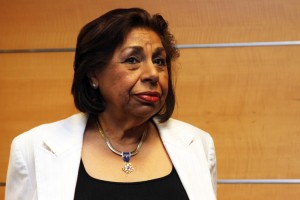Hispanic Heritage Month: Sylvia Mendez
Wednesday, September 29th, 2021People in the United States observe National Hispanic Heritage Month each year from September 15 to October 15. During this period, many Latin American countries celebrate their independence. These countries include Cuba, Costa Rica, El Salvador, Guatemala, Honduras, Mexico, and Nicaragua.
Sylvia Mendez is an American civil rights activist of Mexican and Puerto Rican heritage. Mendez was 8 years old when her father became a plaintiff (person filing suit) in a lawsuit that challenged segregation (racial separation) in public schools. In Mendez v. Westminster, the plaintiffs challenged the legality of segregated schools for children of Latino descent in California. A ruling in favor of the plaintiffs was upheld in 1947, and soon after California outlawed explicitly segregated school systems. The case served as a basis for the case of Brown v. Board of Education of Topeka. In that case, the U.S. Supreme Court in 1954 declared racial segregation in public schools to be unconstitutional.
Sylvia Mendez was born on June 7, 1936, in Santa Ana, California. Mendez and her family moved to Westminster, California, in the mid-1940′s. There, they leased a farm from the Japanese American Munemitsu family, who had been forcibly moved to an internment camp (see Japanese American internment).
In 1943, Mendez’s aunt brought her own children, along with Sylvia and her brothers, to register for the 17th Street School, the school for the white students in the area. The school for Mexican children was run down and supplied with second-hand textbooks. The Mendez siblings were rejected from the 17th Street School. However, their cousins—who had fairer skin and lacked a common Latino surname—were allowed to register. Mendez’s aunt instead removed all the children from the school. Gonzalo Mendez, the father of the Mendez siblings, had attended the school as a child. He appealed to the principal, superintendent, and school board to allow his children and others of Latino descent to attend the school, but they denied his requests.
In the Mexican school, Sylvia Mendez recalls that the students were not taught to read or write. Instead, the girls were taught to knit and sew, and the boys were taught to do labor. Mendez’s mother, Felicitas, took over management of the farm while Gonzalo hired and worked with the civil rights attorney David Marcus. Along with several families in other Orange County school districts, they built a case, Mendez v. Westminster, representing about 5,000 Mexican American children denied equal access to education. Sylvia Mendez sat in court every day of the trial watching her father. The judge ruled in favor of the plaintiffs on Feb. 18, 1946. The ruling was upheld by the appellate court (court of appeals) on April 14, 1947.
Sylvia Mendez went on to earn an associate’s degree in nursing from Orange Coast Community College. She graduated from California State University at Los Angeles with a bachelor’s degree in nursing in 1976. Mendez worked as a pediatric (children’s) nurse for 33 years. After her retirement, she traveled across America to talk about her family’s efforts in favor of desegregation and education equality. In 2001, a new school in Santa Ana was named for Mendez’s parents. Mendez received the Presidential Medal of Freedom—the highest civilian honor awarded by the president—in 2011. Books based on Mendez’s story include Sylvia and Aki (2011) by Winifred Conkling and Separate is Never Equal (2014) by Duncan Tonatiuh. In 2018, a school in Berkeley, California, was renamed the Sylvia Mendez Elementary School.



